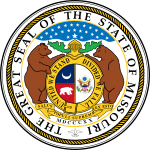
Powell Foulk Clayton was an American politician, diplomat, and businessman who served as the 9th governor of Arkansas from 1868 to 1871, as a Republican United States Senator for Arkansas from 1871 to 1877 and as United States Ambassador to Mexico from 1897 to 1905.

United States gubernatorial elections were held on November 2, 2004, in 11 states and two territories. There was no net gain in seats for either party, as Democrats picked up an open seat in Montana while defeating incumbent Craig Benson in New Hampshire, while Republicans defeated incumbent Joe Kernan in Indiana and won Missouri after Bob Holden lost in the primary. These elections coincided with the presidential election.

United States gubernatorial elections were held on November 4, 2008, in 11 states and two territories. Prior to the election, eight of the total seats were held by Democrats and five by Republicans. Two governors were prohibited by term limits from seeking re-election in 2008. The only governorship to change party was the open seat in Missouri, which was won by a Democrat after being previously held by a Republican.

United States gubernatorial elections were held on November 7, 2000, in 11 states and two territories. The elections coincided with the presidential election. Democrats gained one seat by defeating an incumbent in West Virginia. As of 2025, this remains the last gubernatorial cycle in which a Democrat won in Indiana.
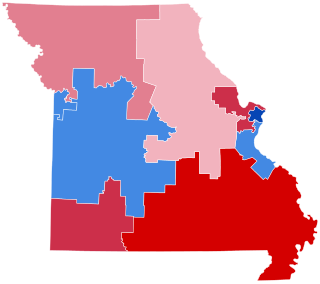
The 2008 congressional elections in Missouri were held on November 4, 2008, to determine who will represent the state of Missouri in the United States House of Representatives. The primary election for candidates seeking the nomination of the Republican Party, the Democratic Party, and the Libertarian Party was held on August 5.
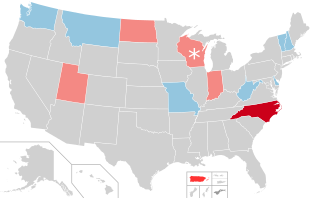
United States gubernatorial elections were held in 12 states and two territories. Of the eight Democratic and four Republican seats contested, only that of North Carolina changed party hands, giving the Republicans a net gain of one governorship. These elections coincided with the presidential election on November 6, 2012. As of 2024, this marked the last time in which a Democrat won the governorship in Missouri and the last time in which a Republican won the governorship in North Carolina.

Jason Thomas Smith is an American businessman and politician who has been the U.S. representative for Missouri's 8th congressional district since 2013. The district comprises 30 counties, covering just under 20,000 square miles of southeastern and southern Missouri.
War Democrats in American politics of the 1860s were members of the Democratic Party who supported the Union and rejected the policies of the Copperheads, or Peace Democrats. The War Democrats demanded a more aggressive policy toward the Confederacy and supported the policies of Republican President Abraham Lincoln when the American Civil War broke out a few months after his victory in the 1860 presidential election.
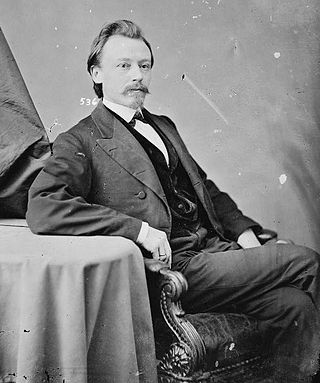
The 1876 Missouri gubernatorial election was held on November 7, 1876, and resulted in a victory for the Democratic nominee, former Congressman John S. Phelps, over the Republican candidate, former Congressman Gustavus A. Finkelnburg, and Greenback nominee J. P. Alexander.

The 1880 Missouri gubernatorial election was held on November 2, 1880 and resulted in a victory for the Democratic nominee, former Congressman Thomas Theodore Crittenden, over the Republican candidate, former Congressman David Patterson Dyer, and Greenback nominee Luman A. Brown.
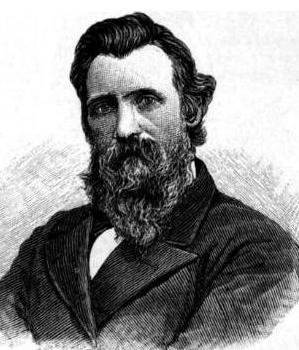
The 1884 Missouri gubernatorial election was held on November 4, 1884 and resulted in a victory for the Democratic nominee, former Confederate general John S. Marmaduke, over the Republican candidate, former Congressman David Patterson Dyer, and Populist nominee John A. Brooks.

The 1908 Missouri gubernatorial election was held on November 3, 1908 and resulted in a victory for the Republican nominee, Missouri Attorney General Herbert S. Hadley, over the Democratic candidate, former Congressman William S. Cowherd, and several other candidates representing minor parties.
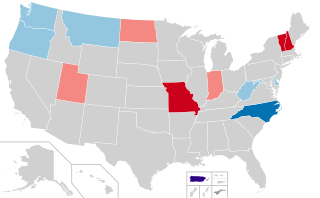
United States gubernatorial elections were held on November 8, 2016, in 12 states and two territories. The last regular gubernatorial elections for nine of the 12 states took place in 2012. The last gubernatorial elections for New Hampshire, Oregon, and Vermont took place in 2014, as Oregon held a special election due to the resignation of Governor John Kitzhaber, while the governors of New Hampshire and Vermont both serve two-year terms. The 2016 gubernatorial elections took place concurrently with several other federal, state, and local elections, including the presidential election, Senate, and House elections.

The 2016 United States House of Representatives elections in Missouri were held on November 8, 2016, to elect the eight U.S. representatives from the state of Missouri, one from each of the state's eight congressional districts. The elections coincided with the 2016 U.S. presidential election, as well as other elections to the House of Representatives, elections to the United States Senate and various state and local elections. The primaries were held on August 2.

United States gubernatorial elections were held on November 3, 2020, in 11 states and two territories. The previous gubernatorial elections for this group of states took place in 2016, except in New Hampshire and Vermont where governors only serve two-year terms. These two states elected their current governors in 2018. Nine state governors ran for reelection and all nine won, while Democrat Steve Bullock of Montana could not run again due to term limits and Republican Gary Herbert of Utah decided to retire at the end of his term.

The 2020 Missouri gubernatorial election was held on November 3, 2020, to elect the governor of Missouri, concurrently with the 2020 U.S. presidential election, as well as elections to the United States Senate, elections to the United States House of Representatives, and various state and local elections. Incumbent Republican governor Mike Parson ran for and was elected to a full term in office. Parson was elected as lieutenant governor in 2016 but became governor on June 1, 2018, after incumbent Eric Greitens resigned under threat of impeachment by the state legislature. Parson declared his bid for a full term on September 8, 2019. State Auditor Nicole Galloway, Missouri's only Democratic statewide officer and only female statewide officer, was the Democratic nominee and if elected, would have become Missouri's first female governor.
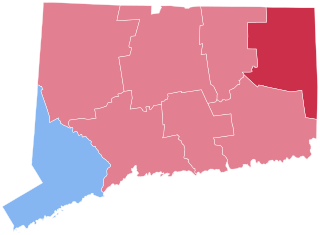
The 1872 United States presidential election in Connecticut took place on November 5, 1872. All contemporary 37 states were part of the 1872 United States presidential election. The state voters chose six electors to the Electoral College, which selected the president and vice president.
Crystal Quade is an American politician who currently serves as Minority Leader in the Missouri House of Representatives, representing the 132nd district. She is a member of the Democratic Party.

In 1868, the Democrats nominated former New York Governor Horatio Seymour for President and Francis Preston Blair Jr. for Vice President. The Seymour-Blair ticket ran on a platform which supported national reconciliation and states' rights, opposed Reconstruction, and opposed both Black equality and Black suffrage. Meanwhile, the Republican presidential ticket led by General Ulysses S. Grant benefited from Grant's status as a war hero and ran on a pro-Reconstruction platform. Ultimately, the Seymour-Blair ticket ended up losing to the Republican ticket of General Ulysses S. Grant and House Speaker Schuyler Colfax in the 1868 U.S. presidential election.

The 1872 United States presidential election in Iowa took place on November 5, 1872. All contemporary 37 states were part of the 1872 United States presidential election. The state voters chose 11 electors to the Electoral College, which selected the president and vice president.

